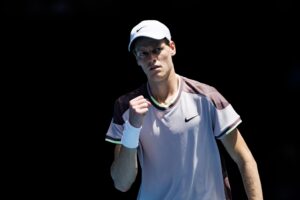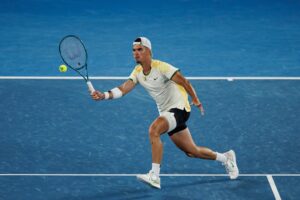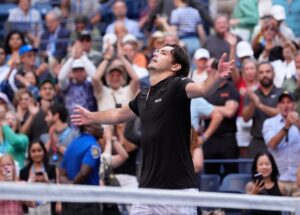In a new series, Martin Keady, our resident tennis historian, looks back at a momentous event in tennis history through the prism of a current event or tournament.
It was a vastly different world that Roger Federer bestrode in February 2018, but then it was a vastly different Federer who bestrode it. When the great Swiss beat Robin Haase in the quarterfinal of the 2018 Rotterdam Open, as usual enjoying the majority of the crowd’s support even though Haase is Dutch, he became the oldest player ever – either male or female – to become world #1, remarkably nearly a decade and a half (14 years, to be precise) since he had first risen to that rarefied position.
It was the culmination of Federer’s late, great period as a tennis artist, one that bears comparison not only with the swan songs of other sportsmen and women but with those of actual artists such as Picasso or Shakespeare. And increasingly it looks like a landmark achievement that he will never again replicate.
Federer went into the 2018 Rotterdam Open after a truly stellar 12 months that had restored him to the pinnacle of men’s tennis. Just over a year earlier, he had stunned the world – not just the tennis world nor even the whole sporting world, but arguably the entire planet – by winning the 2017 Australian Open, his first Major title for nearly five years, in the process defeating his arch-rival, Rafael Nadal, in a Major final for the first time in nearly 10 years.
And he did so by playing arguably the greatest tennis of his entire career, particularly when he came back from 3-1 down in the final set in Melbourne to win five games in a row with perhaps the single greatest set of tennis that anyone has ever played.
Even more incredibly, the 2017 Australian Open was just the first of a hat-trick of Major titles that he would claim over the next year. First, he triumphed at Wimbledon 2017 (having sensibly decided not to play at the 2017 French Open for fear of injuring himself on the punishing clay of Paris), which gave him a truly magnificent eighth Wimbledon title.
That finally separated him from both his idol Pete Sampras and Britain’s William Renshaw, the king of late Victorian tennis, who had both won seven titles apiece, and established him as unarguably the greatest grass-court player ever. Then, having lost in the US Open quarterfinals to his New York nemesis, Juan Martín del Potro (the man who had denied him a sixth successive US Open title in 2009, when the Argentine claimed his only Major title by beating Federer in the final), he retained his Australian Open title in 2018, defeating Marin Čilić in the final as he had done at Wimbledon some six months earlier.
Thus, when Federer rocked up in Rotterdam less than a month after his Melbourne triumph, the stage was quite literally set for him to complete his remarkable late-career return to form by returning to the top of the world rankings for the first time in nearly five years. And typically he did not disappoint, as he swept to victory at the indoor tournament in imperious style. After beating Haase in the last eight, he defeated Italy’s Andreas Seppi in the semifinal before easily beating Grigor Dimitrov in the final, 6-2 6-2, a match in which “BabyFed” (Dimitrov’s unfortunate nickname because of the supposed similarity of his game to Federer’s) had never looked more babyish.
In retrospect, Rotterdam 2018 really was the high-water mark of late, great Federer, because from there on in it has been an almost continuous slide from grace. He lost his 2018 Wimbledon quarterfinal against Kevin Anderson from two sets up; he lost to the Australian journeyman John Millman in four sets at the 2018 US Open; and his remarkable winning run at the Australian Open finally came to an end in January 2019 when he lost in the last eight in Melbourne to Stefanos Tsitsipas.
Although Federer played superbly at Wimbledon in 2019, such that he actually had two match-points in the final against Novak Djokovic, ultimately he could not convert them and eventually lost the first ever fifth-set tiebreak in a Wimbledon final, to complete an unwanted hat-trick of Wimbledon final losses to the Serb.
Since that shattering loss, Federer’s descent has only accelerated. Grigor Dimitrov finally gained a measure of revenge by defeating him in five sets in the 2019 US Open quarterfinals, making Federer look like “Grandad Fed” for the first time in his career. And although Federer amazed everyone, including himself, by reaching the 2020 Australian Open semifinal against Novak Djokovic and even won the first set, eventually his growing injury problems saw him lose rather meekly in four sets. And of course he has not been seen on any court, other than private practice courts, in the pandemic-racked year that has followed.
While Federer has been absent from the ATP Tour, Rafael Nadal has equalled his 20-Major mark with a 13th French Open triumph and Novak Djokovic, fresh from his ninth Australian Open victory just a few weeks ago, looks as if he might just make a serious, concerted attempt to win a Grand Slam of all four Majors this year, if he can beat Nadal in Paris (the biggest if in sport, of course), which would take him to 21 Majors by the end of 2021.
Although Federer still hopes to return to glory this summer with his own attempt at a Triple Crown of Wimbledon, US Open and Olympic titles, the chances are that he will be unable to match the mighty Djokovic, who is nearly six years his junior, and perhaps not even the Next Generation of Grand Slam winners and contenders, led by Dominic Thiem and Daniil Medvedev.
Ultimately, perhaps, Federer might just have wanted to copy his idol and inspiration, Pete Sampras, by bowing out at the top of the game at the start of 2018, when he had not only reached the 20-Major mark that had been thought impossible before his late-period comeback but returned to world #1 by winning in Rotterdam. And yet Federer should not be judged too harshly for having failed to imitate the great American, because their final Major wins were very different.
Sampras had not won a Major for two years before he triumphed at the 2002 US Open and eventually retired a few months afterwards, whereas Federer was arguably playing the greatest tennis he had ever played, which conceivably made it the greatest tennis that anyone has ever played, when he won those three late Majors, and several other important titles including Rotterdam, in that remarkable year between the start of 2017 and the start of 2018.
Whatever happens to Federer in the future, which sooner or later must include his retirement from the sport, the memory of that late great phase, which culminated in the great Dutch port city in February 2018, will sustain and warm him and his legions of fans in the future.
That’s because although he may eventually, or even soon, be overtaken by Nadal and Djokovic as statistically the most successful male tennis player ever, it is highly unlikely that anyone will ever challenge his unofficial title as the most aesthetically successful male tennis player in history, however long tennis is played.
Main photo:
Embed from Getty Images






